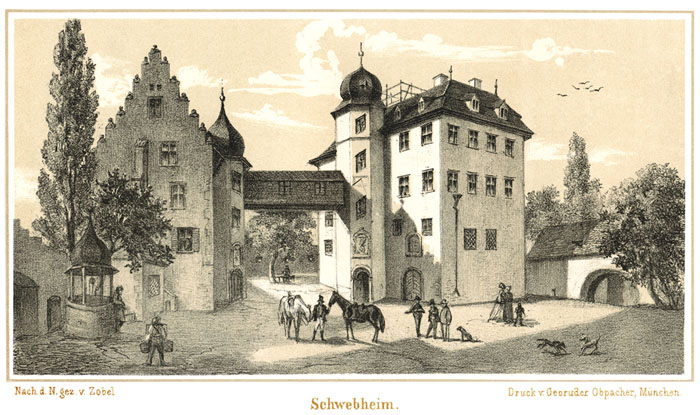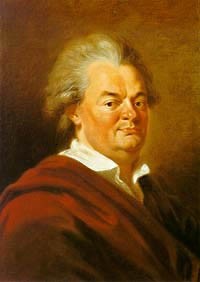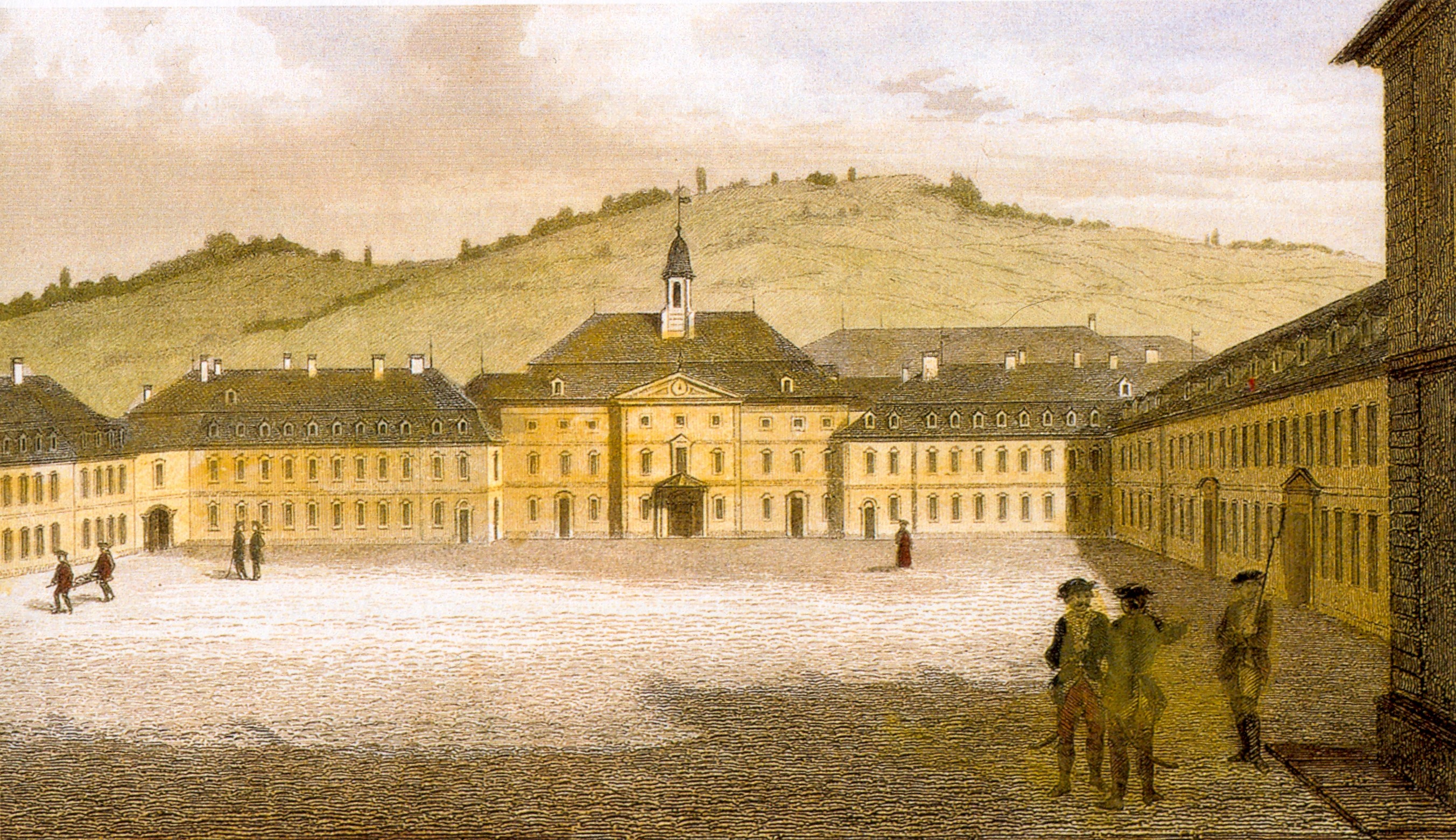|
Willershausen (Herleshausen)
Willershausen is a village and castle in the Gemeinde of Herleshausen in Werra-Meißner-Kreis, Hesse. In 1383, the Treusch von Buttlar were lords of Willershausen and adjacent areas. Already at the end of the 13th Century, the residential tower and the defensive tower of the present castle were built. The Treusch von Buttlar were the owners until the death of Ernst Carl Treusch von Buttlar (see section below) in 1757. The castle came to the von Kutzleben family and the Schwebheim branch of the Bibra family, von Bibra family in 1757. The estate was divided between the two families on 27 September 1817. Ernst von Bibra sold their portion in 1850 to Landgrave Carl August of Hesse. From 1889 to 1992 the Landgraves of Hesse were owner of the property. Today, a golf course is maintained. The church in Willershausen is worth seeing. The Robbers inspiration The relationship to Friedrich Schiller and the history of his play The Robbers is especially interesting. Family of Treusch von ... [...More Info...] [...Related Items...] OR: [Wikipedia] [Google] [Baidu] |
Herleshausen
Herleshausen is a municipality in the Werra-Meißner-Kreis in Hesse, Germany. Geography Location Herleshausen lies north of a section of the boundary with Thuringia in the thickly wooded area between the Ringgau and the Thuringian Forest (ranges) with the Thuringian Forest Nature Park in the southeast. It is found between the river Werra in the south and the Autobahn A 4 (Aachen–Görlitz) in the north. Herleshausen borders on the municipal area of the district-free town of Eisenach, whose main centre lies some 12 km east-southeast. To the district seat of Eschwege to the north-northwest, it is about 22 km, and to Kassel, the nearest city, to the northwest, it is about 60 km (each time as the crow flies). Neighbouring communities Herleshausen borders in the north on the communities of Ringgau (Werra-Meißner-Kreis) and Ifta (Wartburgkreis in Thuringia), in the east on the town of Creuzburg and the community of Krauthausen (both in the Wartburgkreis), in the ... [...More Info...] [...Related Items...] OR: [Wikipedia] [Google] [Baidu] |
Werra-Meißner-Kreis
Werra-Meißner is a ''Kreis'' (district) in the north of Hesse, Germany. Neighboring districts are Göttingen, Eichsfeld, Unstrut-Hainich-Kreis, Wartburgkreis, district-free Eisenach, Hersfeld-Rotenburg, Schwalm-Eder-Kreis, Kassel. History The district was created in 1974 by merging the two districts of Eschwege and Witzenhausen, which had both existed with only slight modifications since 1821. Geography The main river in the district is the Werra. The Hoher Meißner at is the highest elevation of the Meißner mountains, a big basalt massif, the other geographical feature which gave the district its name. The Hoher Meissner was also home to US military forces up to the fall of the Berlin Wall. Soldiers of the Special Forces guarded the eavesdropping post on the hilltop. Coat of arms The coat of arms show a branch of an ash tree in the dexter side, as sign for the former Eschwege district as well as the Eschwege city - the German word for ash tree is ''Esche''. The castle in th ... [...More Info...] [...Related Items...] OR: [Wikipedia] [Google] [Baidu] |
Hesse
Hesse (, , ) or Hessia (, ; german: Hessen ), officially the State of Hessen (german: links=no, Land Hessen), is a States of Germany, state in Germany. Its capital city is Wiesbaden, and the largest urban area is Frankfurt. Two other major historic cities are Darmstadt and Kassel. With an area of 21,114.73 square kilometers and a population of just over six million, it ranks seventh and fifth, respectively, among the sixteen German states. Frankfurt Rhine-Main, Germany's second-largest metropolitan area (after Rhine-Ruhr), is mainly located in Hesse. As a cultural region, Hesse also includes the area known as Rhenish Hesse (Rheinhessen) in the neighbouring state of Rhineland-Palatinate. Name The German name '':wikt:Hessen#German, Hessen'', like the names of other German regions (''Schwaben'' "Swabia", ''Franken'' "Franconia", ''Bayern'' "Bavaria", ''Sachsen'' "Saxony"), derives from the dative plural form of the name of the inhabitants or German tribes, eponymous tribe, the Hes ... [...More Info...] [...Related Items...] OR: [Wikipedia] [Google] [Baidu] |
Schwebheim
Schwebheim is a municipality in the district of Schweinfurt in Bavaria, Germany. Historically important as the location of the Bibra family castle by the same name. The castle was heavily damaged during severe bombings of Schweinfurt in World War II and only partially repaired. Today, the village is fast becoming a suburb of nearby Schweinfurt. Sons & Daughters of the Town *Ernst von Bibra Ernst von Bibra (9 June 1806 in Schwebheim – 5 June 1878 in Nuremberg) was a German Naturalist ( Natural history scientist) and author. Ernst was a botanist, zoologist, metallurgist, chemist, geographer, travel writer, novelist, duelli ... (1806–1878), botanist, zoologist, metallurgist, chemist, geographer, travel writer, novelist, duellist, art collector and trailblazer in ethnopsychopharmacology *Abraham Adler (1850–1922), Economist References External links * Schweinfurt (district) Bibra family {{Schweinfurtdistrict-geo-stub ... [...More Info...] [...Related Items...] OR: [Wikipedia] [Google] [Baidu] |
Bibra Family
The House of Bibra () was one of the leading ''Uradel'' (ancient noble) families in Franconia (northern part of Bavaria) and present day Thuringia from the mid-15th century to about 1600. Later on the family rose from ''Reichsritter'' (Imperial Knights) to ''Reichsfreiherr'' (Barons of the Holy Roman Empire). After the Holy Roman Empire dissolved, they were made ‘’Freiherr’‘ (Barons) of Bavaria and Bohemia. History The earliest references to the family include a document of Bishop Otto of Bamberg from the year 1119 of a ''Rupertus de Bibra''. In 1151 a ''Pertholdus (Berthold) de Bibra'' and his sons ''Pertholdus (Berthold)'' and ''Tagino'' are referenced in another document. The family prospered in numbers, wealth, and influence in the 15th century and early 16th century. By the time of Siebmachers Wappenbuch of 1605, the family is listed as the most important family of Franconia under the rank of Freiherr. By 1600 most of the family died off without hei ... [...More Info...] [...Related Items...] OR: [Wikipedia] [Google] [Baidu] |
Ernst Von Bibra
Ernst von Bibra (9 June 1806 in Schwebheim – 5 June 1878 in Nuremberg) was a German Naturalist ( Natural history scientist) and author. Ernst was a botanist, zoologist, metallurgist, chemist, geographer, travel writer, novelist, duellist, art collector and trailblazer in ethnopsychopharmacology. Biography Ernst's father, Ferdinand Johann von Bibra, (*1756; † 1807), fought under General Rochambeau in the American Revolutionary War on behalf of the colonies. Later he married his brother's daughter, Lucretia Wilhelmine Caroline von Bibra,(b.1778 - d. + 1857). Ernst's father died when he was 1½ years old, and Baron Christoph Franz von Hutten (d. 1830) raised Ernst in Würzburg. He graduated at nineteen from a boarding school in Neuberg on the Danube. Baron Ernst von Bibra started studying law at Würzburg but soon changed over to the natural sciences, especially chemistry. ("Dr. med. & phil." Doctor of medicine & PhD) Martin Haseneier, in his foreword to the 1995 trans ... [...More Info...] [...Related Items...] OR: [Wikipedia] [Google] [Baidu] |
Friedrich Schiller
Johann Christoph Friedrich von Schiller (, short: ; 10 November 17599 May 1805) was a German playwright, poet, and philosopher. During the last seventeen years of his life (1788–1805), Schiller developed a productive, if complicated, friendship with the already famous and influential Johann Wolfgang von Goethe. They frequently discussed issues concerning aesthetics, and Schiller encouraged Goethe to finish works that he had left as sketches. This relationship and these discussions led to a period now referred to as Weimar Classicism. They also worked together on ''Xenien'', a collection of short satirical poems in which both Schiller and Goethe challenge opponents of their philosophical vision. Early life and career Friedrich Schiller was born on 10 November 1759, in Marbach, Württemberg, as the only son of military doctor Johann Kaspar Schiller (1733–1796) and Elisabetha Dorothea Schiller (1732–1802). They also had five daughters, including Christophine, the eldest. ... [...More Info...] [...Related Items...] OR: [Wikipedia] [Google] [Baidu] |
The Robbers
''The Robbers'' (', ) is the first drama by German playwright Friedrich Schiller. The play was published in 1781 and premiered on 13 January 1782 in Mannheim, Germany, and was inspired by Leisewitz' earlier play ''Julius of Taranto''. It was written towards the end of the German ''Sturm und Drang'' ("Storm and Stress") movement, and many critics, such as Peter Brooks, consider it very influential in the development of European melodrama. The play astounded its Mannheim audience and made Schiller an overnight sensation. It later became the basis for Verdi's opera of the same name, '' I masnadieri''. Plot and description The plot revolves around the conflict between two aristocratic brothers, Karl and Franz Moor. The charismatic but rebellious student Karl is deeply loved by his father. The younger brother, Franz, who appears as a cold, calculating villain, plots to wrest away Karl's inheritance. As the play unfolds, both Franz's motives and Karl's innocence and heroism are ... [...More Info...] [...Related Items...] OR: [Wikipedia] [Google] [Baidu] |
Christian Friedrich Daniel Schubart
Christian Friedrich Daniel Schubart (24 March 1739 – 10 October 1791), was a German poet, organist, composer, and journalist. He was repeatedly punished for his social-critical writing and spent ten years in severe conditions in jail. Life Born at Obersontheim in Swabia, he entered the University of Erlangen in 1758 as a student of theology. He led a dissolute life, and after two years' stay was summoned home by his parents. After attempting to earn a livelihood as private tutor and as assistant preacher, his musical talents gained him the appointment of organist in Geislingen an der Steige. Meeting Schubart in Ludwigsburg in 1772, Charles Burney called him "the first, real great harpsichord player that I had hitherto met with in Germany ... He is formed on the Bach school; but is an enthusiast, and original in genius. Many of his pieces are printed in Holland; they are full of taste and fire. He played on the Clavichord, with great delicacy and expression; his finger is brillia ... [...More Info...] [...Related Items...] OR: [Wikipedia] [Google] [Baidu] |
Franconia
Franconia (german: Franken, ; Franconian dialect: ''Franggn'' ; bar, Frankn) is a region of Germany, characterised by its culture and Franconian dialect (German: ''Fränkisch''). The three administrative regions of Lower, Middle and Upper Franconia (largest cities, respectively: Würzburg, Nuremberg and Bamberg) in the State of Bavaria are part of the cultural region of Franconia, as are the adjacent Franconian-speaking South Thuringia, south of the Rennsteig ridge (largest city: Suhl), Heilbronn-Franconia (largest city: Schwäbisch Hall) in the state of Baden-Württemberg, and small parts of the state of Hesse. Those parts of the Vogtland lying in the state of Saxony (largest city: Plauen) are sometimes regarded as Franconian as well, because the Vogtlandian dialects are mostly East Franconian. The inhabitants of Saxon Vogtland, however, mostly do not consider themselves as Franconian. On the other hand, the inhabitants of the Hessian-speaking parts of Lower Franconia ... [...More Info...] [...Related Items...] OR: [Wikipedia] [Google] [Baidu] |
Markt Taschendorf
Markt Taschendorf is a municipality in the district of Neustadt (Aisch)-Bad Windsheim in Bavaria in Germany Germany,, officially the Federal Republic of Germany, is a country in Central Europe. It is the second most populous country in Europe after Russia, and the most populous member state of the European Union. Germany is situated betwe .... Mayor Otmar Lorey is the mayor since May 2020. References Neustadt (Aisch)-Bad Windsheim {{NeustadtBadWindsheim-geo-stub ... [...More Info...] [...Related Items...] OR: [Wikipedia] [Google] [Baidu] |
Karlsschule Stuttgart
Hohe Karlsschule (''Karl's High School'') was the strict military academy founded by Karl Eugen, Duke of Württemberg in Stuttgart, Germany. It was first founded in 1770 as a military orphanage, but then converted into a military academy in 1773 for the duke. Politically the duke was quite unimportant and with this school he wanted to enhance his prestige. In 1770, it was moved to Castle Solitude, and in 1775 into the city. Raised in 1781 by Emperor Joseph II to university status under the name ''Karls Hohe Schule'', it was disbanded after the death of Duke Carl Eugen by his brother Ludwig Eugen, Duke of Württemberg in 1794. The building, situated behind Neues Schloss, was destroyed in World War II. Alumni Friedrich Schiller was one of its alumni.Barbara Schubert-Felmy, ''Die Räuber und andere Räubergeschichten'', Schöningh, 1999. . p. 217. He spent eight years of his life in this academy and suffered a lot in his first years of his stay. At first he was considered an averag ... [...More Info...] [...Related Items...] OR: [Wikipedia] [Google] [Baidu] |





